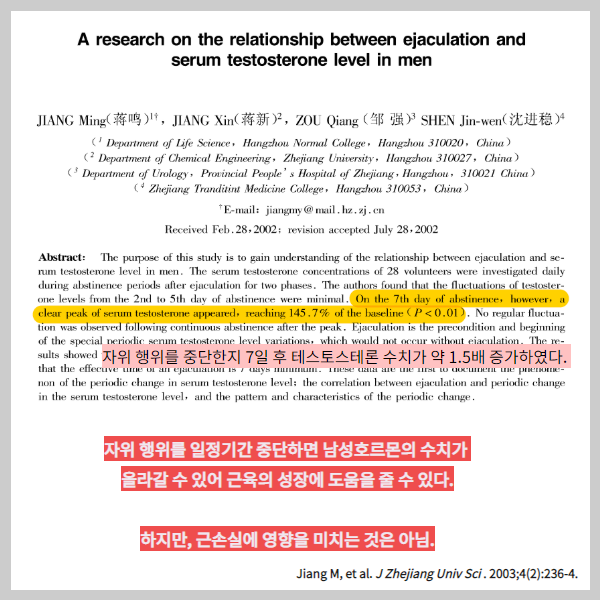
It is said that one of the scariest words for athletes is "muscle loss is coming." Loss of muscle can lead to a decrease in basal metabolism, and a decrease in basal metabolism can lead to a constitution that makes it easier to gain weight, which is an important problem for dieters.
There are many stories about muscle loss, such as "Aerobic exercise leads to muscle loss, Drinking alcohol leads to muscle loss." Today, we're going to clear up some misconceptions about muscle loss.
Does aerobic exercise cause muscle loss?

AMPK is an enzyme that acts as an "energy sensor" in the mitochondria that produce energy during aerobic exercise, and mTOR is an enzyme that is important for skeletal muscle hypertrophy when lifting weights. Experiments have shown that combining weight training with aerobic exercise increases mTOR even more. In other words, aerobic exercise had a greater effect on muscle hypertrophy than muscle loss.
The order of energy expenditure of our body during aerobic exercise published by the MIT University in the United States is as follows: The body uses carbohydrates as its main source of energy, and after 30 minutes, the fat is burned. If you want to burn protein through aerobic exercise, you have to do aerobic exercise for a very long time.

However, if you only do aerobic exercise every day and neglect strength training, you may experience muscle loss. In high-intensity aerobic exercise, your body burns energy from muscles rather than fat to survive. Therefore, the best way to exercise without muscle loss is to use a good mix of strength training and aerobic exercise, and be sure to supplement with protein immediately after exercise.
Does intermittent fasting cause muscle loss?
This is also not the case.
So, does intermittent fasting really lead to muscle loss?
Let's take a look at the paper below. This study divided obese mice into 4 groups and studied how intermittent fasting would affect the clinical markers of the body. Let's take a look at the part we are curious about, which is the 'muscle index'.

After 10 weeks of observation with 4 groups of the same food, the muscles were preserved or even slightly stretched regardless of intermittent fasting and exercise. The results were seen in both males and females.
So, did this result be the same in humans? A 2010 study showed that 12-hour fasting reduced glycogen by 29% and 24-hour fasting reduced glycogen by 57%.
Muscle loss is a process that occurs when the liver and muscles use up all of the glycogen stores, and as I mentioned in the FMD Diet content earlier, it takes about 5 days of fasting to use up all the glycogen stores in the body. In other words, during a short period of fasting, such as intermittent fasting, the glycogen stored in the body cannot be used up, so there is no need to worry about muscle loss.
However, if you are a muscle builder, intermittent fasting is not recommended. Even if muscle loss does not occur, hypertrophy requires energy intake in excess of the daily metabolic rate. We'll talk more about this later.
In addition, if you reduce your food intake for the purpose of dieting, you may experience muscle loss. When you go on a diet, you have to cut down on carbohydrates, but your body uses carbohydrates as an energy source and then breaks down glycogen stored in your muscles to use it as an energy source. This process leads to muscle loss.
Muscles increase basal metabolism, so when muscle mass decreases, basal metabolism decreases, making it easier to gain weight. That's why the most frightening thing for people who exercise is muscle loss. Short-term muscle loss is a decrease in the amount of water in the body, not a decrease in the muscle itself.
Does drinking alcohol cause muscle loss?
That is right. One of the reasons why muscle-building people stay away from alcohol is probably because of muscle loss. It has already been shown in many research papers that the ethanol component of alcohol and acetaldehyde, the primary metabolite of ethanol, inhibit the synthesis of proteins. Ethanol and its metabolites directly inhibit mTOR protein synthesis, which is one of the mechanisms of protein synthesis, and as mentioned in point 1, mTOR is an important factor in muscle hypertrophy.
Does this mean that drinking alcohol only makes it difficult to synthesize and does not affect muscle loss?
Alcohol itself does not promote the mechanism of breaking down muscle proteins, but it can hinder muscle growth and disrupt the balance between muscle production and breakdown, resulting in muscle loss.
If you think about it simply, muscle loss is a process that occurs when the degree of muscle breakdown is greater than the synthesis of the muscle. Here, we will look at the role of insulin, a hormone that affects both the synthesis and breakdown of muscles. Insulin, a hormone that increases when carbohydrates are consumed, increases the synthesis of muscle protein and glycogen and inhibits the breakdown of muscle protein. Without insulin, muscle growth does not occur, even with a high supply of protein.
In the following papers, it has been demonstrated that alcohol interferes with the mechanisms that inhibit the breakdown of proteins of insulin and IGF-1.
Does sexual activity cause muscle loss?
Then, of course, some people may think that ejaculation can cause the release of male hormones and the excretion of semen, which is a clump of protein, which may lead to muscle loss. However, in general, the amount of semen excreted by a man during a single ejaculation is about 2~5ml on average, and 80~90% of it is made up of water. In other words, the amount of protein in semen is only about 5%, which is about 0.1~0.3g. Considering that an adult man's daily protein intake requirement is 56 grams, it would take more than 500 ejaculations a day for muscle loss.
However, if you stop masturbating for a period of time or refrain from sexual activity, your levels of male hormones will increase, which can help your muscles grow a little bigger and stronger.

Muscle is harder to lose than to build. Ordinary people don't have to worry about muscle loss as much as they think. Rather, cortisol, the stress hormone released when you worry about muscle loss, can interfere with muscle growth. Muscle loss is not easy unless you do high-intensity aerobic exercise without nutrients, extreme stress, frequent drinking, or long-term inactivity.
Muscles are made up of more than 70% water. Short-term muscle loss is the actual loss of water, not the breakdown of the muscle itself. Short-term muscle loss can be achieved with proper exercise and protein supplementation. A recent study by McMaster University in Canada found that sufficient protein intake of 20~40g after strength training can maximize muscle protein synthesis. If you're experiencing muscle loss, you can flip the switch on muscle growth by exercising and eating protein, right? We wish you a healthy life with proper strength training, aerobic exercise, and stress-free daily life




